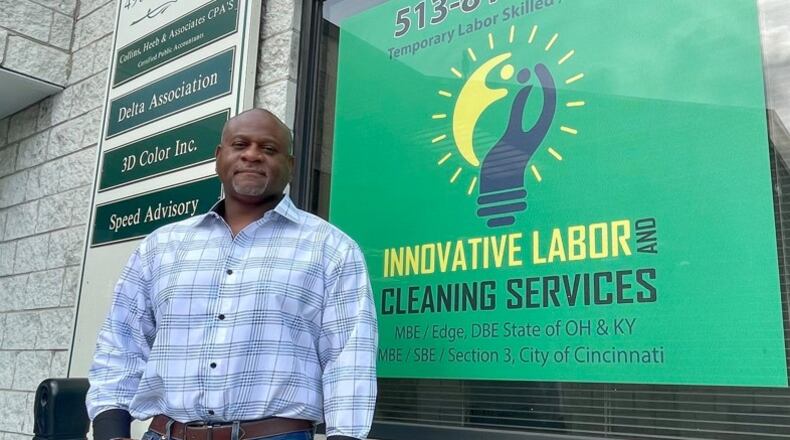Then a serendipitous meeting with Troy Parker, owner of Innovative Labor and Cleaning Services in St. Bernard, a suburb of Cincinnati. It was Parker and six of his employees who saved the event, Bates said, because canceling the event was not an option.
The Play Ball Gala at Spooky Nook was organized by the Greater Hamilton Chamber of Commerce and was the first event held at the 1.2 million-square-foot facility that features a convention center and hotel on the east side of North B Street, and a multi-event complex on the west side of the road.
Close to 1,000 people attended the $100 ticketed event that featured three floors of music, food, and activities.
“We had no intention of canceling the event,” said Bates, though the experience he and others planned would have been hindered. “But we still wanted to make sure that all the attendees had an equally terrific experience.”
Bates said he had no idea how they were going to get people from floor to floor with no elevator, especially those with mobility issues, because he wanted them to “have the same experiences.” Compressing everything on one floor “would really ruin the event,” he said.
“The purpose of this event was to celebrate this moment in history, and it was also to showcase the functionality and flexibility of the space,” Bates said.
Bates met Parker at an Ohio Department of Transportation event where they were talking about re-entry citizens, and had a follow-up meeting two days before the Play Ball Gala. He planned to cancel the meeting, but Bates is now glad he didn’t because “who really saved the day were these really terrific six re-entry citizens.”
The six guys solved the puzzle of getting band equipment on the second and third floors, and the base for the mechanical bull on the third floor ― they carried it up ― and Bates said they were so proactive that they helped out with things that needed to be done without being asked.
They were invited to help out during the night of the gala, and Bates said, “We were so impressed by them, that we had some of them come back the following week and help us with things at the chamber.”
The idea for Parker’s company started before he was in prison for bank fraud. He developed his business plan for what became Innovative Labor and Cleaning with the goal to use re-entry citizens.
“My goal was to hire other people like me, returning citizens coming home from prison so that they would have a job,” Parker said. “I saw when I was in prison a lot of guys come back because they can’t find a job. They’ll start using drugs, commit crimes or something like that.”
When he got out of prison in May 2015, he had $500 and a plan. He incorporated his business, passed out business cards and went to work.
Parker said he had his doubters, people telling him, “You’re never going to get a bunch of convicts to work together. It will never work.”
By the time he got out of the halfway house later in 2015, his company was grossing six figures. And now he’s helping re-entry citizens around southwest Ohio, other parts of Ohio, Michigan, Kentucky, and even in Texas. It’s all to give these re-entry citizens a second chance, which starts by giving them a job, then teaching them personal development and life skills.
Parker tells the men and women that they “might have committed a crime, but you’re not the crime. That’s just the behavior. You made a mistake, and you can move past that.”
Many re-entry citizens face societal barriers as they look for a second chance, especially those who are people of color.
A Sentencing Project report showed that Black Americans are incarcerated in state prisons nearly five times more than white Americans. Latinx people are 1.3 times as likely to be incarcerated than white people, the October 2021 report showed.
When they get out of prison, they face issues getting jobs, Parker said.
Parker said his goal is about opening their minds to the possibility of being a productive citizen, then comes goal-setting and other areas of self-improvement. And many men and women who are given a second chance will move on to another job, most often by the people that hired them temporarily.
“My whole goal was they start with me, somebody will see them, and they hire them, and they move on,” he said. “It’s really to help give them a step up.”
Bates said his staff still talk about “how great those guys were,” and “it lowered their wall of concern against giving re-entry workers an opportunity.”
About the Author




